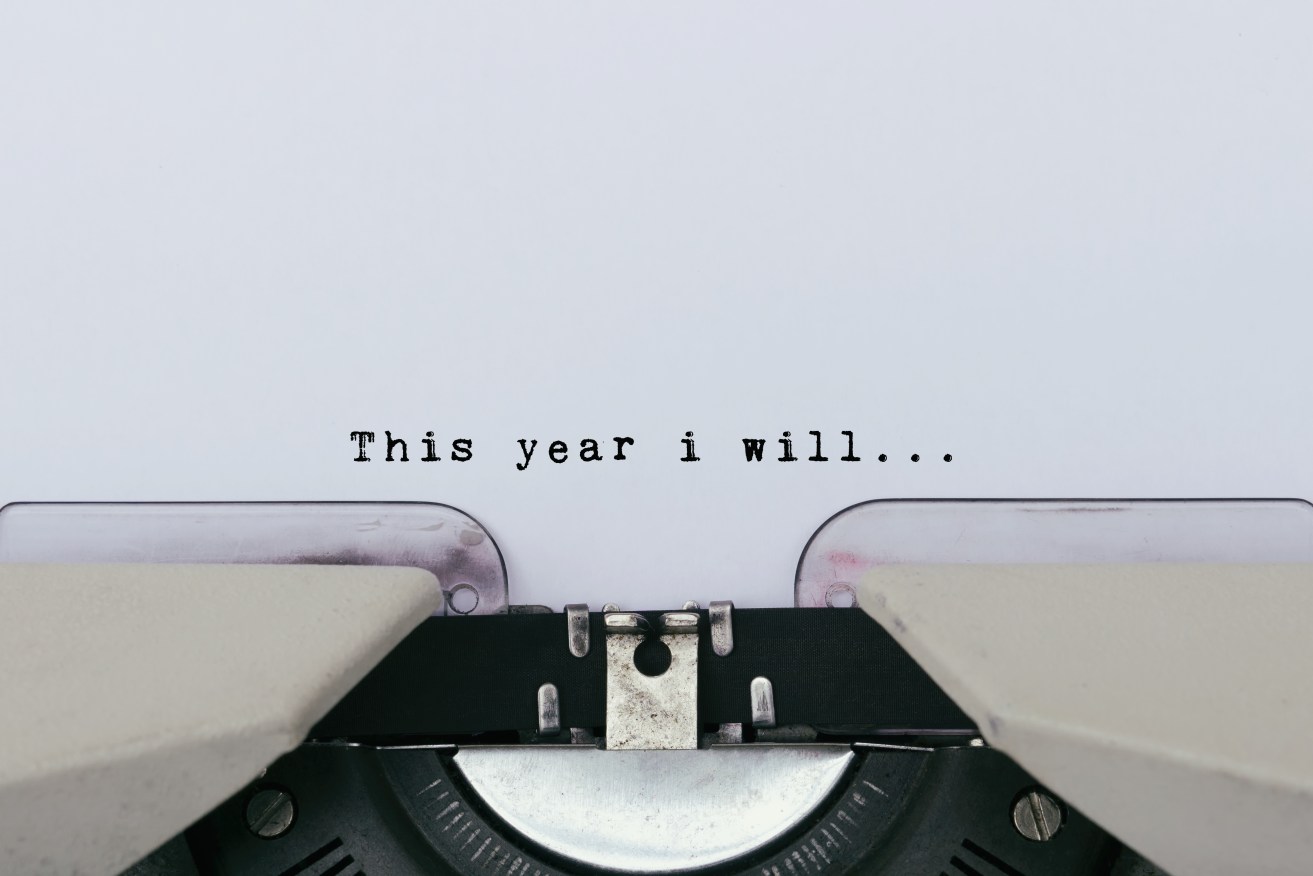Broken your New Year’s resolutions already? Get a grip


Have a think about why and how you made certain New Year's promises to yourself. Photo: Getty
Here’s a New Year’s resolution of mine that’s paid off. And boy, it’s come to fruition less than two weeks of me making it.
I’d resolved to expose the media for making something up because there wasn’t much else going on in this holiday period.
And here it is. I’m exposing Quitter’s Day. Said to be the second Friday in January.
This is the day when you’re purportedly most likely to abandon your New Year’s resolutions. That is, those promises made when your lips were still damp from that New Year kiss at midnight.
Really?
If true, let’s just call it Hissy Fit Day.
Have you truly realised, within a matter of days, that you’ll never join the gym, eat more fruit, learn how to iron your shirts, keep to a budget or be a more charitable, less selfish person?
Or is it the case that you can’t be damned trying?
Or, are you overwhelmed with shame and feelings of failure because you’ve already slipped?
So what if you’ve taken a drink, missed a few days of exercise, blown half your wages on frippery, gewgaws and gadgets, and privately abused the neighbours for having another party?
There’s always tomorrow. The great thing about being alive, is you can try and try again.
But it’s just all too hard!
What could this really mean – if true – that most people abandon the life-changing promises they’d made to themselves within a matter of days?
The obvious, harsh conclusion is that we’re evolved into a species that doesn’t cope with moments of failure.
Certainly, some people behave that way – giving up on a dream or a notion or a new job at the first sign of difficulty.
Or even at the first hint that there might be some difficulty.
To be fair, some dreams need to be quashed … and quickly. Heading off to climb Everest with no training or experience but plenty of heart? Nah. Leave it alone.
But is Quitter’s Day really a thing?
Or is it just a rough average as to when most people tend to give up on their resolve to change?
There’s a lot of wild guessing out there.
The Economic Times in India says the majority give up within one to six weeks of starting, and many of these resolutions are repeated year after year.
Forbes says 80 per cent of people quit their resolutions by the end of January.
The desire for change is there
People want to change, but for what reason? Sometimes, there’s a feeling of being coerced into giving up your bad habits and adopting healthier or wiser behaviours.
In a Forbes Health survey, from October, 61.7 per cent of respondents said they feel pressured to set a New Year’s resolution.
Many respondents were planning on setting multiple goals with 66.5 per cent stating they plan on making three or more resolutions for the year ahead.
This is a great way to set yourself up for failure, by thinking big and over-promising.
Meanwhile, in conflict with the social or family pressure to change, there’s just as much peer pressure for you to forget about sobriety or saving money or even being kinder.
The devil is your best friend, whispering in your ear. Come on.
Is change even possible?
If you’re looking for an easy way out of your resolutions, looking for someone to blame, preferably a couple of experts, checkout Verywell Mind, a wellness site where the articles are reviewed by a medical board.
In an article, published New Year’s Day, Dr Cynthia Vinney, an expert in media psychology, says that one of the biggest issues with New Year’s resolutions is that they often revolve around huge changes like adjusting our eating habits, getting more sleep, or becoming fluent in a new language.
The point being is that these common resolutions are harder to achieve that people realise when they first take a crack at them. And there’s also the reality that some people aren’t ready to change.
This is largely because they haven’t thought it through. They haven’t invested emotionally to these changes. And they haven’t put together a plan. And you need a plan.
As psychologist Terri Bly told Verywell Mind:
“Where we go wrong with New Year’s resolutions is there’s this idea that it’s supposed to be some big, sweeping change, because that sounds kind of sexy.”
But humans, she says, “are not wired to make big, sweeping changes”.
Part of the challenge is that personal change, the desire for it, is to an extent a moral inquiry. Except we don’t think of it that way. It might help it we did.
What the big thinkers say
Years ago, I took the problem of New Year’s resolutions to a number of philosophers. One of these was Alain de Botton, the London-based writer who has made philosophy a television star (Status Anxiety) and a staple of the international bestseller lists (The Consolation of Philosophy).
He championed the much-maligned New Year’s resolution as a vital tool in keeping human society nicer – relatively safe, an abundance of goodwill – than not.

Philosophers suggest that New Year resolutions are a moral inquiry. Photo: Getty
He told me:
“We live in an age obsessed by the language of honesty and authenticity. This suggests that all of us have a real self, someone we truly are deep down – which is supposed to be good, essentially honest, well-meaning and kind. But those who believe in resolutions might look at the matter a different way.”
He said that we don’t tend to make resolutions about things we completely believe in. “Few of us would ever resolve to be appalled by war or disease. It just comes naturally,” he said.
“A resolution always hovers over a grave inner conflict and constitutes a vow by one part of ourselves against the other to be kinder or more hardworking because deep down, we’re perhaps not so pure. Left to our own devices, we’re self-indulgent, selfish, narcissistic and lazy.”
Resolutions are like little laws
Alain de Botton said we need resolutions for the same reason as we need laws – to keep ourselves in check.
“Resolutions are minor laws that we pass against our unruly selves. In making resolutions, we tacitly admit that we are harmed by being free to do anything – and through our vows, signal a desire to take up the higher freedom that comes from being correctly shackled.”
But it goes deeper than that. It goes deeper than turning up at the gym or visiting aged relatives in care or taking a more patient tone with your children.
What’s going on when we resolve to be better is, probably unconsciously, a search for the truth of things – requiring clarity of purpose.
And it’s this clarity of purpose that is compromised, especially in the silly season of unpredictable emotion and social drinking, when delusion and self-preservation seem such friendly creatures.
Said de Botton: “Just as a bad detective can see the evidence, but not draw the right conclusions from it, so too we can spend time ‘with ourselves’, reconsidering our lives – and come up with analyses which are self-serving and sentimental, dishonest and mendacious.
“Much here has to do with honesty, which is in turn connected to possessing the courage to face difficult truths.”
Self awareness, at the shallow end
On the face of it, for some people self-awareness involves no more than a stab of regret at selling certain shares too soon – or congratulating oneself on making a clean getaway after a drunken shag with a stranger. Most of us can think of a colleague or acquaintance – or a cousin – who apparently trawls the shallows of the soul. We make them our clowns.

Socrates said the unexamined life isn’t worth living. Resolutions are part of that examination.
On the one hand, they appear to suffer less existential pain. On the other hand, heartfelt concerns tied purely to the material world – be it accumulating goods or abandoning all to hedonistic oblivion – suggest a lack of conscience. And perhaps a lack of real enjoyment.
There’s plenty of evidence that even the most shallow-hearted are victim to the same doubting rain that falls upon us in the dark. That is, our fears, regrets. They’re simply in less of a rush than the rest of us to look at them. The truth of things sits under our noses.
Professor John Bigelow, now a Professor Emeritus in Monash University’s philosophy department, talked to me about the idea from Socrates, that the unexamined life isn’t worth living.
Bigelow doesn’t believe Socrates was talking about examining our lives in the ways that the psychoanalyst does.
Or in the ways that we all do when we gossip about one another, he said. “He wasn’t thinking about taking an inventory of particular events in our lives. I think he was urging us to occasionally think about ends, and not just about means.”
And here’s the real point. “Philosophy asks what things there are that are worth seeking for their own sakes and not just as means towards something else.”
What do you want deep down?
In other words, what do you want beyond the house, the car, the shiny shoes? The thinkers seem to agree that this is a pretty good question to take to the room of mirrors on New Year’s Day.
“Asking these questions evokes a distinctive kind of feeling, a sense of a life as a whole, or of the world as a whole,” said Professor Bigelow.
“This feeling is part of what is often called ‘religious feeling’ or ‘spirituality’. Sometimes you experience related feelings when listening to music, or reading, or losing yourself in contemplation of a great painting, or in dance.”
He said that when you ask these questions “prosaically, in words, as philosophical questions, alas it’s not often that you think of any useful answers”.
Yet sometimes, maybe we do make up our minds about what it is that we are choosing to strive for.
“What’s it all for?” he said.
“Happiness maybe? Or maybe richness and intensity of existence? Or truth? Sometimes artists seem to be willing to sacrifice their own happiness, and the happiness of others close to them, in order to achieve great art or fame or ‘immortality’. Sometimes if you don’t take stock of what you really want, life just slips away and you lose your chance.”
If all that’s a bit heavy, go here for a simple way of changing your life.








